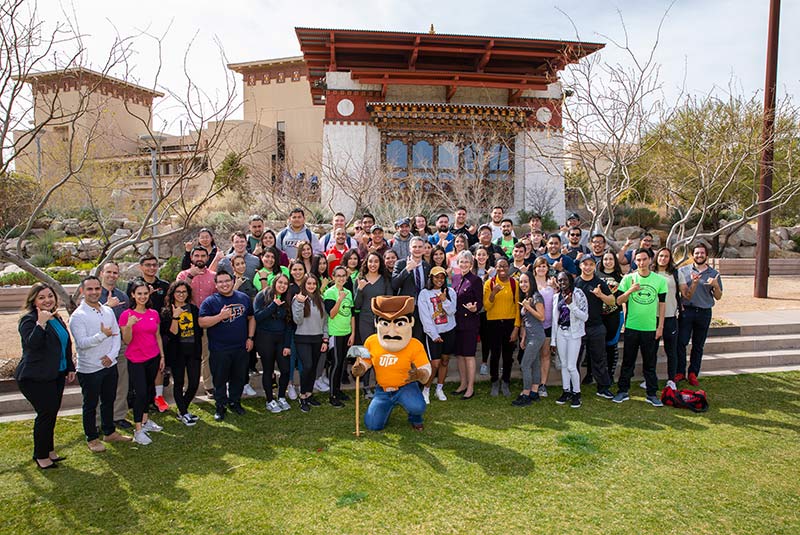UTEP Achieves National Community Engagement Distinction
Last Updated on February 17, 2020 at 12:00 AM
Originally published February 17, 2020
By UC Staff
UTEP Communications
The University of Texas at El Paso has earned the Community Engagement Classification - the Carnegie Foundation's highest standard of recognition for reciprocal, sustainable and mutually beneficial scholarly partnerships with local, regional and national communities.

“The Community Engagement Classification recognizes UTEP’s positive impact on the economy and well-being of the community we serve,” UTEP President Heather Wilson said. “UTEP is one of only 73 top tier research universities in the U.S. that are also strong on community engagement. Our faculty and students deserve a lot of credit for being committed to both.”
This Community Engagement Classification is one of seven classifications created by the Carnegie Foundation as a guiding framework to help identify institutional diversity in U.S. higher education. The foundation’s framework, known as the Carnegie Classification of Institutions of Higher Education, continues to be used for a wide range of purposes by academic researchers, institutional personnel and policymakers.
“The institutions that we are recognizing today are doing extraordinary work in addressing their societal responsibilities in and through community engagement and service,” said Paul LeMahieu, senior vice president at the Carnegie Foundation for the Advancement of Teaching. “In doing so, they bring scholarship, knowledge and expertise to address real challenges in our communal lives.”
The Carnegie Foundation also designated UTEP as a top tier doctoral university with very high research activity (R1) in December 2018 based on the number of doctoral degrees awarded and strong research expenditures. UTEP awarded 121 doctoral degrees during the last academic year (2018-19) and earned $108 million in research grants during the same period. UTEP is also the fourth most research-intensive public university in Texas, behind UT Austin, Texas A&M College Station and the University of Houston, as measured by annual federal research expenditures.
“Earning both Carnegie recognitions affirms at the highest level UTEP’s commitment to provide students with an exceptional education and do meaningful work that positively impacts the economy and well-being of the community we serve,” said John Wiebe, interim provost and vice president for academic affairs.
The Community Engagement Classification is voluntary and evidence-based, requiring institutional self-assessment followed by a national review to validate the full extent of community engagement demonstrated in the institution’s mission, identity and commitments.
The Carnegie Foundation specifically noted UTEP’s excellent alignment of engagement among the campus leadership, culture, resources, curricular practices and accreditation objectives. At the time of the application, 43% of UTEP’s sponsored-projects portfolio directly impacted the Paso del Norte community; UTEP’s faculty taught over 480 community-engaged courses during the 2017-18 academic year; and more than 15,000 students engaged in the community through their academic courses or through service projects with community partners.
“Our faculty and students’ contributions go well beyond work in campus laboratories,” Wiebe said. “We are grateful for our campus partners who help us identify complex social challenges, our faculty who work to integrate teaching, research and service for the benefit of our community, and our talented staff who work tirelessly to facilitate community engagement.”
UTEP started a clear path to creating an engaged university when it received its first 10-year Community Engagement Classification in 2010.
“The Carnegie Foundation broadened the criteria necessary to retain the classification,” said Azuri Gonzalez, director of the UTEP Center for Community Engagement (CCE). “We have spent the last decade growing community engaged practices on campus, including creating the Provost’s Council on Community Engagement, incorporating engagement into the University’s Handbook of Operating Procedures, establishing the President’s Community Engaged Scholars award to promote faculty engagement scholarship, and implementing a Civic Action Plan.”
UTEP’s Community Engagement Classification is valid until 2026, at which time UTEP will have to reapply to retain its status. UTEP is one of only 119 institutions across the country that achieved this premier distinction in the 2020 cycle.